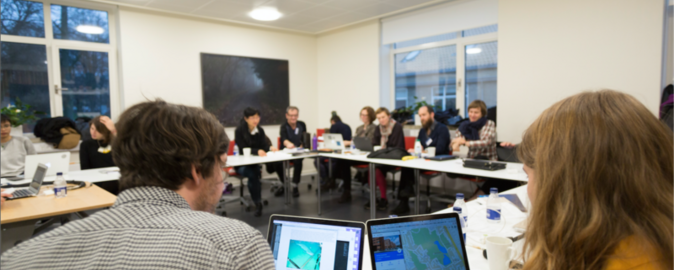Upcoming lectures and activities related to Computational Thinking and Design

During March and April there is a number of lectures and activities that relate to CCTD. The list below will be update when further details are available
Guest lecture by Nick Montfort | 22 Mar 2018 (Thur) 15.00-17.00, venue Building 5008-138
Abstract: One of the problems that is acute in the digital humanities but also noticeable in many art projects is that a detailed proposal is often developed and delivered before any significant *computational* exploration of the topic has been done. A plan of this sort might be needed for a grant application, for instance, in which the deliverables and outcomes need to be named. Essentially, the conclusion has to be written before the artist/investigator, or before a group of collaborators, has even started to think about the problem using computation. In framing this issue, while of course I acknowledge that art and the humanities have different approaches and purposes, I consider both of them to be types of inquiry, ways to ask questions about matters ranging from perception to material culture to philosophical concepts. I argue that today’s frequently-taken approach, proposing the development of a tool or an artwork that is described in detail, is usually flawed. Instead, it makes sense to begin computational inquiry by using general-purpose programming to explore questions of interest and to feel one’s way around the relevant data and computation. This is done in creative computing classes; it is what expert individuals who have all the requisite skills often do to develop projects that do not require grant funding; and it is also a good approach when people need to collaborate on a project and some bring technical background, some experience in artistic practice or humanistic methodologies, and some various types of subject-matter or domain expertise.
- Nick Montfort studies creative computing and develops computational art and poetry. His computer-generated books of poetry include #!, the collaboration 2×6, Autopia, and The Truelist. Among his more than fifty digital projects are The Deletionist and Sea and Spar Between, both collaborations. His MIT Press books, collaborative and individual, are: The New Media Reader, Twisty Little Passages, Racing the Beam, 10 PRINT CHR$(205.5+RND(1)); : GOTO 10, and Exploratory Programming for the Arts and Humanities, and The Future. He is professor of digital media at MIT and lives in New York and Boston.
Open Forum: Teaching to learn, learning to teach | 23 Mar 2018 (Friday) 0900-1500, venue Digital Living Research Commons (Wiener 030, Building 5347)
The open forum Learning to Teach, Teaching to Learn is originally initiated and organised by the School of Poetic Computation since 2016 in the United States. The event aims to bring together educators to explore pedagogy, curriculum development, and how to create environments and tools for learning computation and programming. At Aarhus University, programming has been introduced to both Bachelor and Master students in the areas of Digital Design and Information Studies, which is situated in the School of Communication and Culture. This mini open forum, Teaching to Learn and Learning to Teach, explores how computational thinking could be introduced beyond Computer Science and Engineering disciplines, and what are the challenges in teaching programming to arts and humanities? How might programming practice be considered as a mode of aesthetic and critical inquiry? How the production of creative works may help students to understand the essential components of computational thinking?
For more information see the full post on Digital Aesthetics Research Center.
Guest Lecture by Anders Visit | 20 Apr 2018 (Fri), 14.00-16.00 @ The small Auditorium, Building 5510, INCUBA Science Park
- Aarhus based artist and founder of !null, a public forum for artists, researchers, developers and hackers using contemporary technology for creative expression and aesthetic inquiry. https://andersvisti.dk/
